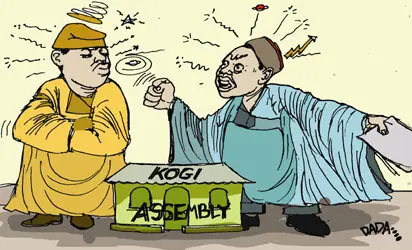It became clear to all that the Nigerian Constitution did not envisage nor provided for the eventuality of death of a candidate at an election, who was on the verge of winning, but had not been proclaimed.
When Alhaji Abubakar Audu the APC candidate, tragically died in the early hours of Sunday, November 22, 2015, a cat was let loose amongst the pigeons of Nigerian political society.
As we have seen over the past few days, lawyers have been very busy attempting to legally unravel the situation at hand. Senior lawyers like Auwalu Yadudu and Femi Falana have proffered opinions on the correct legal positions, while Wole Olanipekun, another senior lawyer, has spoken on behalf of the deputy governorship candidate of the APC in the “inconclusive election”.
When the Independent Electoral Commission, INEC, asked the APC to submit another candidate for the concluding sequel to the election, it appeared on the surface, that a definitive finale was being approached. Of course, there are still bitter recriminations along the way; for instance, the sitting Governor Wada wants to be declared winner of the election and that is a position to test in court.
But the more complicated issue is within the APC itself and the stance of the Deputy Governorship candidate James Abiodun Faleke. He rejected the party’s decision to field Yahaya Bello to replace the late Alhaji Abubakar Audu.
Faleke argued that he was “governor-elect” and so couldn’t be another person’s running mate; and was already putting forward the late Audu’s son as his own running mate! How these internal APC issues evolve will also significantly impact on the more serious underlining currents.
Underlining currents
In the aftermath of Prince Audu’s death, there were genuine outpourings of emotions in the Igala-speaking part of Kogi State as well as reported acts of violence. These came, especially in the days after, when the issue of a substitute candidacy went on the front burner of political discourse.
For the first time since Kogi’s creation, the likelihood was emerging of an unintended power shift to one of the other ethnic constituencies of the state, namely the Ebirra and Okun.
This is the most important underlining current really, because it was clear that Audu’s unexpected death was going to change the dynamics of politics and power configuration of Kogi State. The idea of substituting with Audu’s son was dropped early because it was not going to fly!
Faleke was prepared to name Audu’s son running mate, as sop to the family as well as the Igala community at large. Yahaya Bello is particularly unacceptable to the Audu political family because he was said to have worked against Audu after he lost the primary and was not even gracious enough to be part of the APC campaign team before the election. The fact that he would become beneficiary of Audu’s death rankles Audu’s supporters, who must now genuinely fear that they would lose out with a Yahaya Bello governorship in Kogi State.
This unplanned power shift will have serious consequences for Kogi’s future. But it should also focus our minds on the underbelly of the states creation process in Nigeria which ostensibly had been done to remove domination by larger groups in the old regions and states, but ended up creating much worse forms of domination.
Kogi is one of the main examples of that trend along with Benue. In the old Kwara State, Adamu Attah, an Ebirra man, could become governor because larger states obliged the elite groups to learn consensus building. But where states have become smaller and there is a dominant ethnic group as we have with the Tiv in Benue and the Igala in Kogi, then a tyranny of ethnic numbers can easily be instituted to the detriment of all.
The Igala elites have literally run a state in their own image since the creation of Kogi and if Prince Audu had not died, that project of dominance was set to continue. What it took was to pick a running mate from one of the other two ethnic blocs and learn how to play one against the other,while sufficiently retaining loyalty of the Igala homefront.
Prince Audu’s tragic death is about to drastically change the equation and offer a new opportunity for the ascendancy of a different set of ethnic elites as well as the potentials for a re-configuration of the prebendal values underpinning the local politics of Kogi State.
The Kogi conundrum speaks very much for a radical surgical intervention in the nature and number of our states. As they are today, they are clearly unwieldly and unsustainable. Many people have proffered ways out; mine has been a consistent call for a return to the 12 states of the Gowon era. There were six in the North and six in the South. Each was big enough to become a serious locus of development and because, in most cases, they are multi-ethnic, that consensus building skill that seems lost today, will have to be rediscovered by the Nigerian political elite. It was such consensus building skill that was often lost where a dominant ethnic elite can control the political space as we have seen in a state like Kogi since it was created. The “Confluence State” is navigating through very treacherous political currents at the moment!


